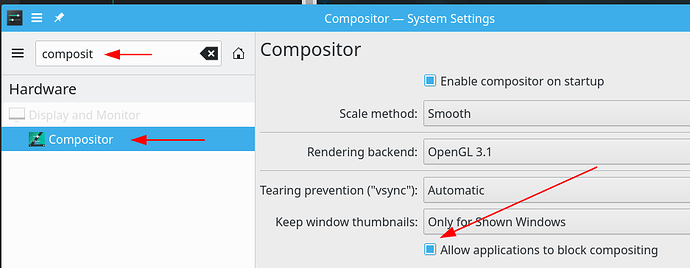Whenever Im in a full screen game, my second monitor becomes unusably laggy when I have anything that moves on the second monitor. Most noticeably when I have a video open it draws a like 1 frame every second and the mouse becomes unusable. I also notice this when trying to scroll through a wiki page or something when in game. I’m thinking its probably some kind of Nvidia issue but I’m not sure what.
System:
Kernel: 5.10.7-3-MANJARO x86_64 bits: 64 compiler: gcc v: 10.2.1
parameters: BOOT_IMAGE=/boot/vmlinuz-5.10-x86_64
root=UUID=b07453a6-cfde-4f37-8e50-6f90b53b72b6 rw quiet apparmor=1
security=apparmor udev.log_priority=3
Desktop: KDE Plasma 5.20.5 tk: Qt 5.15.2 info: latte-dock wm: kwin_x11
dm: SDDM Distro: Manjaro Linux
Machine:
Type: Desktop Mobo: Micro-Star model: Z370M MORTAR (MS-7B54) v: 1.0
serial: <filter> UEFI: American Megatrends v: 1.20 date: 03/08/2018
CPU:
Info: 6-Core model: Intel Core i5-8600K bits: 64 type: MCP arch: Kaby Lake
note: check family: 6 model-id: 9E (158) stepping: A (10) microcode: DE
L2 cache: 9 MiB
flags: avx avx2 lm nx pae sse sse2 sse3 sse4_1 sse4_2 ssse3 vmx
bogomips: 43212
Speed: 800 MHz min/max: 800/4400 MHz Core speeds (MHz): 1: 800 2: 800 3: 800
4: 800 5: 800 6: 800
Vulnerabilities: Type: itlb_multihit status: KVM: VMX disabled
Type: l1tf
mitigation: PTE Inversion; VMX: conditional cache flushes, SMT disabled
Type: mds mitigation: Clear CPU buffers; SMT disabled
Type: meltdown mitigation: PTI
Type: spec_store_bypass
mitigation: Speculative Store Bypass disabled via prctl and seccomp
Type: spectre_v1
mitigation: usercopy/swapgs barriers and __user pointer sanitization
Type: spectre_v2 mitigation: Full generic retpoline, IBPB: conditional,
IBRS_FW, STIBP: disabled, RSB filling
Type: srbds mitigation: Microcode
Type: tsx_async_abort mitigation: Clear CPU buffers; SMT disabled
Graphics:
Device-1: NVIDIA GP106 [GeForce GTX 1060 6GB] vendor: Micro-Star MSI
driver: nvidia v: 460.32.03 alternate: nouveau,nvidia_drm bus ID: 01:00.0
chip ID: 10de:1c03
Display: x11 server: X.Org 1.20.10 compositor: kwin_x11 driver:
loaded: nvidia display ID: :0 screens: 1
Screen-1: 0 s-res: 3840x1080 s-dpi: 101 s-size: 967x272mm (38.1x10.7")
s-diag: 1005mm (39.5")
Monitor-1: DVI-D-0 res: 1920x1080 hz: 60 dpi: 102
size: 477x268mm (18.8x10.6") diag: 547mm (21.5")
Monitor-2: DP-0 res: 1920x1080 hz: 144 dpi: 94 size: 519x293mm (20.4x11.5")
diag: 596mm (23.5")
OpenGL: renderer: GeForce GTX 1060 6GB/PCIe/SSE2 v: 4.6.0 NVIDIA 460.32.03
direct render: Yes
Audio:
Device-1: Intel 200 Series PCH HD Audio vendor: Micro-Star MSI
driver: snd_hda_intel v: kernel bus ID: 00:1f.3 chip ID: 8086:a2f0
Device-2: NVIDIA GP106 High Definition Audio vendor: Micro-Star MSI
driver: snd_hda_intel v: kernel bus ID: 01:00.1 chip ID: 10de:10f1
Sound Server: ALSA v: k5.10.7-3-MANJARO
Network:
Device-1: Intel Ethernet I219-V vendor: Micro-Star MSI driver: e1000e
v: kernel port: f000 bus ID: 00:1f.6 chip ID: 8086:15b8
IF: enp0s31f6 state: down mac: <filter>
Device-2: ASIX AX88179 Gigabit Ethernet type: USB driver: ax88179_178a
bus ID: 2-3:2 chip ID: 0b95:1790 serial: <filter>
IF: enp0s20f0u3 state: up speed: 1000 Mbps duplex: full mac: <filter>
Drives:
Local Storage: total: 2.05 TiB used: 508.26 GiB (24.2%)
SMART Message: Unable to run smartctl. Root privileges required.
ID-1: /dev/sda maj-min: 8:0 vendor: Seagate model: ST2000DM006-2DM164
size: 1.82 TiB block size: physical: 4096 B logical: 512 B speed: 6.0 Gb/s
serial: <filter> rev: CC26
ID-2: /dev/sdb maj-min: 8:16 model: SATA SSD size: 238.47 GiB block size:
physical: 512 B logical: 512 B speed: 6.0 Gb/s serial: <filter> rev: 61.2
Partition:
ID-1: / raw size: 43.95 GiB size: 43 GiB (97.86%) used: 33.86 GiB (78.7%)
fs: ext4 dev: /dev/sdb5 maj-min: 8:21
ID-2: /boot/efi raw size: 489 MiB size: 488 MiB (99.80%)
used: 3.6 MiB (0.7%) fs: vfat dev: /dev/sdb8 maj-min: 8:24
ID-3: /home raw size: 735.62 GiB size: 723.08 GiB (98.29%)
used: 474.32 GiB (65.6%) fs: ext4 dev: /dev/sda3 maj-min: 8:3
Swap:
Kernel: swappiness: 60 (default) cache pressure: 100 (default)
ID-1: swap-1 type: partition size: 3.84 GiB used: 73.5 MiB (1.9%)
priority: -2 dev: /dev/sdb6 maj-min: 8:22
Sensors:
System Temperatures: cpu: 29.8 C mobo: 27.8 C gpu: nvidia temp: 47 C
Fan Speeds (RPM): N/A gpu: nvidia fan: 47%
Info:
Processes: 251 Uptime: 4h 36m wakeups: 0 Memory: 15.59 GiB
used: 5.44 GiB (34.9%) Init: systemd v: 247 target: graphical.target
Compilers: gcc: 10.2.0 clang: 11.0.1 Packages: 1723 pacman: 1695 lib: 437
flatpak: 22 snap: 6 Shell: Zsh v: 5.8 running in: yakuake inxi: 3.2.02
